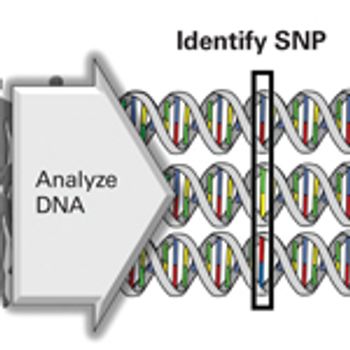
The FDA has announced a new comprehensive plan for tobacco and nicotine regulation designed to serve as a road map to better protect American children and reduce tobacco-related disease and death.

Your AI-Trained Oncology Knowledge Connection!


The FDA has announced a new comprehensive plan for tobacco and nicotine regulation designed to serve as a road map to better protect American children and reduce tobacco-related disease and death.

In our latest ongoing cartoon series set in the world of oncology and cancer care, a radiologist uncovers a known risk factor.

Adherence to screening protocols at cancer centers resulted in fewer emergency department visits and hospitalizations in the 2-month period after the screening.

This video reviews the mechanisms of acquired and upfront endocrine resistance in estrogen receptor–positive breast cancer as well as research into strategies for overcoming this resistance.

This video discusses chemotherapy decision-making in early-stage breast cancer, and reviews tools such as PREDICT 2.0 and the MammaPrint 70-gene assay that can help guide treatment.

The FDA has expanded the indication for a scalp cooling device that reduces hair loss during chemotherapy.

More privately insured cancer patients seeking to participate in clinical trials received approval since the passage of the Affordable Care Act, according to a new study.

This video examines how planned radiation will impact management of the axilla in breast cancer patients undergoing mastectomy.

The understanding of the relationship between genetic variation and an individual patient’s response to radiation therapy has gained significant ground over the past several years. Genetic markers have been identified that could ultimately serve as the foundation for predictive models in clinical practice, and that hold the potential to revolutionize the delivery of precision medicine in oncology.

In this interview we discuss the goals of the Community Oncology Alliance, highlights from their annual meeting, and the challenge of transitioning cancer care to the hospital setting.

As specific candidate genes become more well established and gene expression assays gain sophistication, the value in clinical outcomes prediction and treatment selection is expected to transform the practice of radiation oncology.

A 70-gene expression score can identify women with indolent breast cancer at “ultralow” risk, according to a new study. Women with such a score have extremely low risk of disease-specific mortality over 20 years without systemic therapy.

Proton-beam therapy was found to be safe for patients with limited-stage small-cell lung cancer in the first prospective registry study of the therapy, with only a small number of high-grade toxicities.

A combination of netupitant and palonosetron was non-inferior to aprepitant plus granisetron in preventing chemotherapy-induced nausea and vomiting.

This video reviews new studies examining the genetic drivers of three rare genitourinary cancers: von Hippel-Lindau disease, advanced papillary renal cell carcinoma, and penile cancer.

Dear Patient-Although the circumstances were stressful, it was indeed a pleasure meeting you and your family today. There are words I wanted to say to you today but didn’t, for fear of distracting you from the immediate plan and also, I must admit, out of a certain degree of evasiveness.

This video reviews the management approach for prostate cancer in older patients, including when screening is appropriate and how geriatric assessments can guide treatment decisions.

What is the effect of statin use on overall survival in elderly patients with platinum-resistant ovarian cancer? Do you know the cumulative ovarian cancer risk to age 80 years for BRCA1 and BRCA2 mutation carriers? Test your knowledge of ovarian cancer in our latest quiz.

This video examines an early trial studying abemaciclib for the treatment of brain metastases in patients with hormone receptor–positive, HER2-negative breast cancer.

This video highlights 7-year follow-up data from the APT trial, which studied adjuvant paclitaxel and trastuzumab for node-negative, HER2-positive breast cancer.

Continuing to hold institutions to specific outcomes may never result in spending control. We need to educate individual physicians on cost-effectiveness in treatment planning.

In this interview we discuss new data on the use of radiotherapy in cancer patients with brain metastases.

According to a study recently presented at the 2017 American Society of Clinical Oncology Annual Meeting, held June 2–6 in Chicago, women diagnosed with endometrial cancer are oftentimes not provided with genetic counseling referrals.

Lenvatinib demonstrated noninferiority to sorafenib with regard to overall survival in patients with previously untreated, unresectable hepatocellular carcinoma.

This video examines how a change to weight-based pembrolizumab dosing in first-line PD-L1–positive lung cancer could save nearly $1 billion in US healthcare costs.

Although hematologic oncologists see the value in hospice, their concerns about the adequacy of services for their patients with blood cancers may limit hospice referrals.

This video examines challenges and opportunities in getting older patients with cancer enrolled in clinical trials.

The use of a four-gene signature identified a series of subgroups of triple-negative breast cancer, including one subtype that was responsive to platinum-based chemotherapy in the metastatic setting.

Analysis from a phase III trial confirmed the prognostic value of a 16-gene recurrence score in patients with high-risk renal cell carcinoma undergoing adjuvant sunitinib therapy.

A new study found that patients with mCRPC had higher PSA response with enzalutamide vs abiraterone, but no difference in time to progression, and reported worse outcomes in those with quantifiable ctDNA.